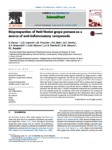Please use this identifier to cite or link to this item:
http://www.alice.cnptia.embrapa.br/alice/handle/doc/986684| Title: | Bioprospection of Petit Verdot grape pomace as a source of anti-inflammatory compounds. |
| Authors: | DENNY, C.  LAZARINI, J. G.   FRANCHIN, M.   MELO, P. S.   PEREIRA, G. E.   MASSARIOLI, A. P.   MORENO, I. A. M.   PASCHOAL, J. A. R.   ALENCAR, S. M.   ROSALEN, P. L.   |
| Affiliation: | Piracicaba Dental School, Department of Physiological Sciences, University of Campinas; Piracicaba Dental School, Department of Physiological Sciences, University of Campinas; Piracicaba Dental School, Department of Physiological Sciences, University of Campinas; Department of Agri-food Industry, Food and Nutrition, ‘Luiz de Queiroz’ College of Agriculture, University of São Paulo; GIULIANO ELIAS PEREIRA, CNPUV; Department of Agri-food Industry, Food and Nutrition, ‘Luiz de Queiroz’ College of Agriculture, University of São Paulo; Department of Agri-food Industry, Food and Nutrition, ‘Luiz de Queiroz’ College of Agriculture, University of São Paulo; Department of Physics and Chemistry, School of Pharmaceutical Sciences of Ribeirão Preto, University of São Paulo; Department of Agri-food Industry, Food and Nutrition, ‘Luiz de Queiroz’ College of Agriculture, University of São Paulo; Piracicaba Dental School, Department of Physiological Sciences, University of Campinas. |
| Date Issued: | 2014 |
| Citation: | Journal of Functional Foods, v. 8, p. 292-300, 2014. |
| Description: | The aim of this study was to evaluate the anti-inflammatory activity of Petit Verdot Extract and hexane, chloroform and ethyl acetate fractions obtained from grape pomace, in addition to identifying active compounds. The PVE and EAF reduced significantly paw edema and neutrophil migration when compared with control groups. The PVE reduced levels of TNF-α and IL1-β in the peritoneal fluid, whereas the EAF did not reduce cytokines significantly. Two hydroxybenzoic acids, two proanthocyanidins, three flavan-3-ol monomers and three anthocyanins were identified in the PVE and EAF by LC-MS/MS. The stilbene transresveratrol was identified only in the EAF. The phenolic compounds were quantified using HPLC-DAD analysis, except for the stilbenes, which were not sensible for the detection by the method. Since PVE and EAF showed significantly anti-inflammatory effects and high concentration of phenolic compounds, we concluded that Petit Verdot pomace could be an interesting source of anti-inflammatory bioactives. |
| Thesagro: | Uva Bagaço Antiinflamatorio Composto fenolico |
| NAL Thesaurus: | Grape pomace Anti-inflammatory activity Phenolic compounds |
| Keywords: | Petit Verdot |
| Type of Material: | Artigo de periódico |
| Access: | openAccess |
| Appears in Collections: | Artigo em periódico indexado (CNPUV)  |
Files in This Item:
| File | Description | Size | Format | |
|---|---|---|---|---|
| Bioprospection.pdf | 544,64 kB | Adobe PDF |  View/Open |









